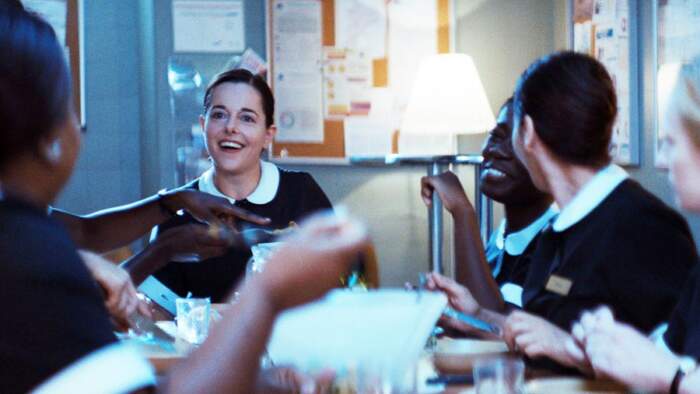By Roger Costa
FULL TIME
In the opening scene of director Eric Gravel’s sophomore film, a woman is watched in deep sleep just to be woken up by a very early alarm clock. It is a necessary moment, the human body recharging process, most likely the only one where she is finally at peace. She gets up, fetches and feeds her little children, notices the boiling water system isn’t working, worries about the traffic jams and strikes on the welfare system, drops them at the elderly nanny-neighbor’s house, sun hasn’t come up yet, and she runs not to miss the train. A head maid at a luxurious Parisian hotel, she gets busy, overwhelmed with all the duties required by her title, including training new girls, making sure all the rooms are promptly neat and orienting all staff to show up to work despite the transit impossibilities. When she has a chance, she runs to her phone, calls her absent ex-husband in an attempt for him to take the kids when she needs a break, but he always fails to answer. She is also anxiously awaiting an interview call, an opportunity at a new job that could change this exhaustive, intense and somehow humiliating routine. She wonders if life will continue like that, forced to work hard to maintain her children, which drastically translates to the sacrifices of spending time with them.

Meticulously observed, almost as a contemplation, the camera swings according to Julie’s pace, and that’s always at a high speed. She barely sees the sunlight, as she leaves her home before the sun hits the face of earth and returns at later hours, to much discontent of her neighbor who has to take care of her children. Such euphoric energy is grandiously captured by the cinematographer Victor Seguin, and enhanced by the vibrant, techno music of Irene Dresel. These elements work harmoniously with the film’s message and atmosphere, which presents aesthetic reminscences of “Falling Down” and “Run Lola Run” as well as presenting the neorealism influence of the Dardennes.

In his second directorial effort, writer-director Eric Gravel leaves an impressive mark as a storyteller who understands the hot topics of his generation and the essential role of cinema: educate and entertain. Addressing the sacrifices, the risks and struggle of a single mother in making ends meet, Gravel paints a timely portrait of a modern woman’s financial trouble and the increasingly scarce working field for women reaching an older age. His concern with social economics are evident throughout the film, punctuated by glimpses on the strike’s consequences to mass transit and how it infuriatingly impacts those at a vulnerable situation. In most cases, including here, when facing hard conditions to commute and failing to make it on time, the working class ends up losing their job without any consideration for the reasons or fatcs. The system needs someone present, no matter how, it must go on. These cruel facts of the minority’s struggle at working place and social conditions are brilliantly explored and executed.

Actress Laure Calamy proves once again why she is currently one France’s most celebrated leading performers. She is ascending as a major star ready to claim all due respect and recognition. With this incredibly remarkable work she confirms such status, conceiving an unforgettable character who will do anything to get her life on the right track. Even if sometimes she needs to go against the rules, sacrifice her relationship and time-spending with her children, and violating working morals and conducts. Calamy fiercely embraces this strong and determined, yet vulnerable and disoriented character presenting a top-notch portrait of motherhood, ambition, uneasiness and the insatiable quest for sucess and satisfaction.
Winner of the Best Director and Best Actress Awards at Venice Film Festival’s Horizons section, it is a potent, accurate, high-octane drama that brings a powerful statement on economics and a career-defining performance by Calamy.
(Music Box Films. 2/3. Quad Cinema.)



















Comments